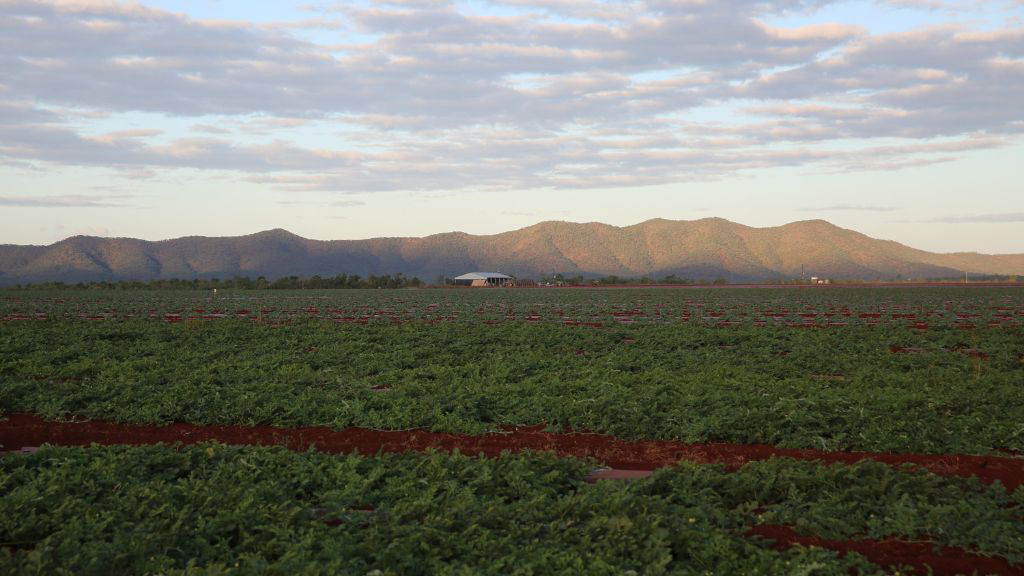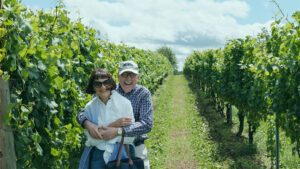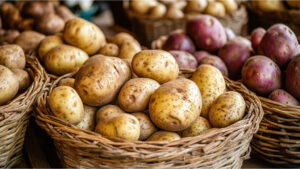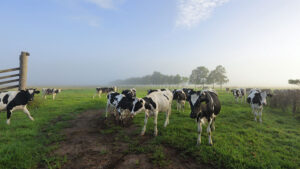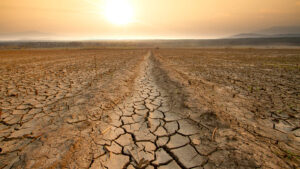Shaun Jackson may be a latecomer to farming but he’s making up for lost time. He exports specialty melons to Japan, is passionate about on-farm sustainability, and is one of the first melon growers to join a world-first initiative that lets consumers pre-buy fruit in return for a slice of the profit.
Describe your farm operation
We grow watermelons and honeydew on around 200 hectares of drip line plastic at Lakeland on the southern end of Cape York Peninsula. We have weekly plantings of 4-7 hectares per week. Our season runs May/June through to just before Christmas and at our peak time (Oct/Nov) we’re sending out 15,000-20,000 boxes of melons a week to Japan and the domestic market.
What are the benefits and challenges of growing melons at Lakeland?
The climate here is amazing. We’ve got clear skies, warmer nights, higher soil temperatures and virtually no rainfall from the end of March to December. The dry growing season means rainfall doesn’t interrupt growth patterns and we can control our plants much better with irrigation and fertiliser. It’s considerably warmer overnight here than other melon growing regions like inland of Darwin. And because we’re elevated at 270 metres, we’re still in the vicinity of 30-35 degrees when the Territory is already hitting temperatures in the 40s.
You come from a corporate background in the seed business. What made you want to get more hands-on and start farming yourself?
Not being tied to corporate businesses and not having accountants telling me what to do! As a seed company manager working in product development I saw so many things on farms all over the world, and helped a lot of farmers. But I really wanted to put what I knew into practice. I wanted to develop an export program from Australia that I could take to other growers and develop a really substantial industry out of this country. We had to do a really good job of it to demonstrate it could be done, so that when people said “Yes but…”, I could say “We’ve done it.” I think we could take Japan by storm if we changed our attitude.
So what’s holding the industry back?
The low quality and low price activity in the Australian marketplace. Major supermarkets don’t want large farmers doing big volumes. What they’ve done is create a situation where there’s so much pressure for price that you have to shift volume to do it, and it’s hard to shift volume and maintain quality in this country – especially with labour around $37.50 an hour.
You recently partnered with Invest In Farming Cooperative (IIF) which invites everyday consumers to invest in what you grow at the start of the growing season in return for a share of the profit. What attracted you to that model? And what did it deliver?
I was attracted to IIF for two reasons: I wanted to share the reality of farming and develop relationships with the people who invested in my crops, so they could see the effort we put in to produce quality and flavour. Secondly, in the last three years our inputs have increased by more than 30%. Based on current figures it will cost another 30% this coming year alone. That’s another $1.5m we have to find out of profit to pay for that increase. It costs us over a million dollars before we even start harvest. That’s a huge risk to take. So to have IIF come along and help us cover those high early costs and share the risk, that’s a big thing for me for the future.
What difference did that early access to capital make?
I could sleep. And my poor wife could sleep. Farming is a very difficult, stressful and expensive business. You go through six months not knowing if you’re going to make money at the end of the year. The partnership with IIF takes some of the stress away. It’s been a really rewarding relationship and we’re going to offer even more of our production to IIF investors next season.
Caring for land and soil is a priority at Daintree Fresh. Why is that important to you, and what are you doing on-farm?
This land has to last generations – whether I have it or not. If you want to improve health – whether that’s a person’s health or a plant’s health – you have to find the cause of the issue, work on that issue, and then you don’t need the chemistry. We have a ‘Bugs for Bugs’ approach. I bring beneficial bugs in like Californicus which predates red spider mite, aphid and whitefly. So we sprinkle Californicus throughout the paddocks when the weather is conducive for other pests. The pests start to reproduce and the Californicus controls them. It’s like a war going on in the paddock – you see the shells and dead bodies of the nasties all around you. We use organic carbon and probiotics, and we only use the ground once and then replace everything we took out of the soil. By balancing plant nutrition we’ve got good plant health and good resistance to insects and diseases. We’ve reduced our chemical use to a quarter of what it was.
What are you proud of?
This is only our seventh season. I’m surrounded by people who’ve been at it for two or three generations, and we’re showing them there are improvements that can be made and it’s commercially viable. People would assume from my corporate background that I wouldn’t succeed, but we have succeeded as an industry player and as an international marketer and as a production system. But what I’m most proud of is that every time you cut and eat our fruit, it tastes great.
